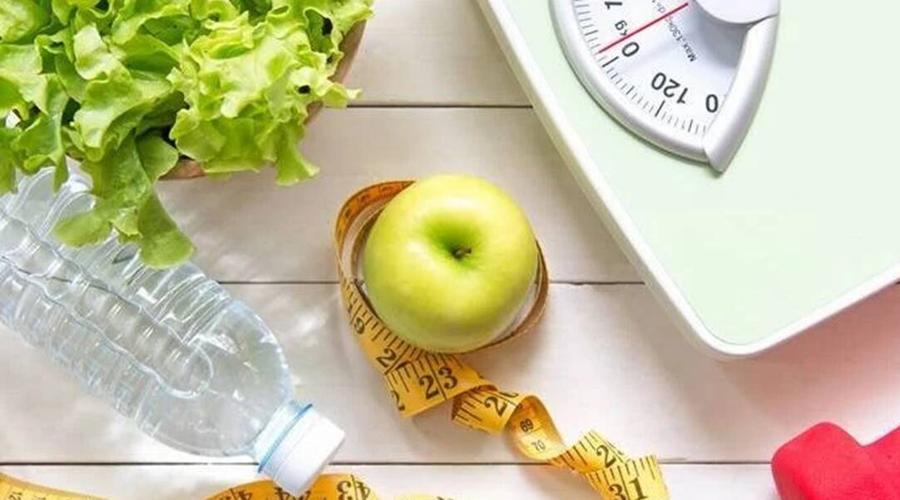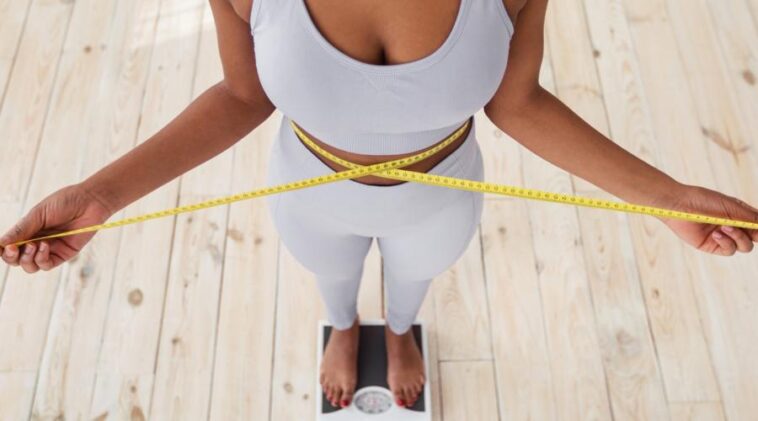Losing 40 pounds in just 2 months is an extremely challenging goal, and it is not recommended by health professionals to lose weight at such a rapid pace. However, if you are determined to try, here are some tips that may help you:
Create a calorie deficit: To lose weight, you need to create a calorie deficit, which means burning more calories than you consume. You can achieve this by reducing your calorie intake and increasing your physical activity.
Follow a healthy diet: To lose weight in a healthy way, you should follow a balanced diet that is rich in nutrients and low in calories. Focus on consuming lean protein, vegetables, fruits, and whole grains, and avoid processed foods and sugary drinks.
Exercise regularly: Regular exercise is essential for weight loss. Aim for at least 30 minutes of moderate-intensity exercise, such as brisk walking, jogging, cycling, or swimming, every day.
Stay hydrated: Drinking enough water can help you feel full and reduce your calorie intake. Aim for at least 8 glasses of water per day.
Get enough sleep: Getting enough sleep is essential for weight loss. Lack of sleep can disrupt your metabolism and increase your appetite.
Remember, losing 40 pounds in just 2 months is an ambitious goal, and it is important to consult with a healthcare professional before embarking on any weight loss program. A healthy and sustainable weight loss rate is typically 1-2 pounds per week.
What Is Lose Weight Workout
A “lose weight workout” is a workout routine designed to help individuals lose weight by burning calories and increasing their metabolism. These workouts typically involve cardiovascular exercise, strength training, or a combination of both.
Cardiovascular exercise, such as running, cycling, or swimming, is a great way to burn calories and improve cardiovascular health. It can be done in various forms and intensities, depending on your fitness level and preferences.
Strength training, such as weightlifting or bodyweight exercises, can help build muscle mass, which can increase your metabolism and help you burn more calories even when you are at rest.
A combination of cardio and strength training can provide a balanced workout routine that helps you burn calories, build muscle, and improve overall fitness.
It’s important to note that while exercise is an essential component of a healthy weight loss program, it should be combined with a healthy diet and lifestyle habits for maximum effectiveness.
How Is It Safe How To Lose 40 Pounds In 2 Months
Losing 40 pounds in just 2 months is an ambitious goal, and it is not recommended by health professionals to lose weight at such a rapid pace. Losing weight too quickly can be unsafe and may result in various health issues such as malnutrition, dehydration, gallstones, and muscle loss.
A healthy and sustainable rate of weight loss is typically 1-2 pounds per week. To achieve this rate, it is recommended to follow a balanced diet and exercise regularly. This approach not only helps in weight loss but also improves overall health and well-being.
It’s important to consult with a healthcare professional before embarking on any weight loss program, especially if you have any underlying health conditions or are taking any medications. They can provide guidance and support in creating a safe and effective weight loss plan that meets your individual needs and goals.

What Is The Best Way To Lose Weight Quickly
The best way to lose weight quickly and safely is by creating a calorie deficit through a combination of a healthy diet and regular exercise. Here are some tips that may help:
- Focus on nutrient-dense foods: Eat plenty of whole, nutrient-dense foods such as fruits, vegetables, lean protein, and whole grains, while limiting processed foods and sugary drinks.
- Reduce your calorie intake: To lose weight, you need to consume fewer calories than you burn. You can do this by reducing your portion sizes, cutting back on snacks and desserts, and avoiding high-calorie foods.
- Increase your physical activity: Regular exercise is an essential component of weight loss. Aim for at least 30 minutes of moderate-intensity exercise, such as brisk walking, jogging, cycling, or swimming, most days of the week.
- Drink plenty of water: Drinking enough water can help you feel full and reduce your calorie intake. Aim for at least 8 glasses of water per day.
- Get enough sleep: Getting enough sleep is important for weight loss. Lack of sleep can disrupt your metabolism and increase your appetite.
It’s important to note that while it is possible to lose weight quickly, it is not recommended to lose weight too rapidly as it can be unsafe and may result in various health issues. A healthy and sustainable rate of weight loss is typically 1-2 pounds per week.
How Many Calories Should Eat Per Day To Lose Weight
The number of calories you should eat per day to lose weight depends on various factors such as your age, gender, height, weight, and physical activity level. However, as a general rule, to lose weight, you need to create a calorie deficit by burning more calories than you consume.
To achieve a healthy and sustainable weight loss rate of 1-2 pounds per week, it is recommended that women consume 1200-1500 calories per day and men consume 1500-1800 calories per day, depending on their individual factors.
It is important to note that eating fewer calories than your body needs for a prolonged period can lead to malnutrition and other health issues. Therefore, it is essential to consume a balanced diet that includes plenty of whole, nutrient-dense foods such as fruits, vegetables, lean protein, and whole grains, while limiting processed foods and sugary drinks.
It’s always best to consult with a healthcare professional or registered dietitian to determine the right calorie intake for your individual needs and weight loss goals.
What Types Of Foods Should Eat To Lose Weight
To lose weight, it’s important to consume a balanced diet that includes plenty of nutrient-dense foods while limiting processed foods and sugary drinks. Here are some types of foods that can support your weight loss goals:
- Fruits and vegetables: These are low in calories, high in fiber, and packed with vitamins and minerals. They help you feel full and satisfied while providing important nutrients.
- Lean protein: Protein helps you feel full and satisfied, and it’s essential for building and repairing muscles. Good sources of lean protein include chicken, fish, turkey, beans, lentils, and tofu.
- Whole grains: Whole grains are rich in fiber and nutrients and can help you feel full and satisfied. Choose whole-grain bread, brown rice, quinoa, and oatmeal instead of refined grains.
- Healthy fats: Healthy fats, such as those found in nuts, seeds, avocado, and olive oil, can help you feel full and satisfied while providing important nutrients.
- Water: Drinking plenty of water can help you stay hydrated and reduce your calorie intake.
It’s important to note that while certain foods can support weight loss, it’s important to consume a balanced and varied diet that meets your individual nutritional needs. It’s also important to consume a moderate amount of calories to ensure that you are not depriving your body of important nutrients. A registered dietitian can help you create a personalized meal plan that supports your weight loss goals.

How To Lose 40 Pounds In 2 Months Without Exercise
Losing 40 pounds in just 2 months without exercise is a challenging goal, as regular exercise is an essential component of weight loss. However, there are some changes you can make to your diet and lifestyle that can support weight loss:
Reduce calorie intake: To lose weight, you need to consume fewer calories than you burn. You can do this by reducing your portion sizes, cutting back on snacks and desserts, and avoiding high-calorie foods.
Choose nutrient-dense foods: Eat plenty of whole, nutrient-dense foods such as fruits, vegetables, lean protein, and whole grains, while limiting processed foods and sugary drinks.
Drink plenty of water: Drinking enough water can help you feel full and reduce your calorie intake. Aim for at least 8 glasses of water per day.
Get enough sleep: Getting enough sleep is important for weight loss. Lack of sleep can disrupt your metabolism and increase your appetite.
Reduce stress: Stress can contribute to weight gain by increasing cortisol levels, which can increase appetite and lead to overeating. Try to manage stress through activities such as meditation, yoga, or deep breathing exercises.
It’s important to note that while it is possible to lose weight without exercise, regular exercise is an essential component of a healthy weight loss program. It can help you burn more calories, build muscle, and improve overall health and well-being. Therefore, it’s always best to include some form of physical activity in your weight loss plan, even if it’s just a brisk walk or some light stretching.
How Much Exercise Should Do To Lose Weight
The amount of exercise you need to lose weight depends on various factors such as your current weight, fitness level, and weight loss goals. However, as a general guideline, the American College of Sports Medicine recommends that adults get at least 150 minutes of moderate-intensity exercise or 75 minutes of vigorous-intensity exercise per week to achieve and maintain weight loss.
Moderate-intensity exercise includes activities such as brisk walking, cycling, or swimming, while vigorous-intensity exercise includes activities such as running, high-intensity interval training, or aerobic dance.
In addition to cardiovascular exercise, strength training is also important for weight loss as it helps build muscle mass, which can increase your metabolism and help you burn more calories even when you are at rest. The American College of Sports Medicine recommends strength training exercises that work all major muscle groups at least two days per week.
It’s important to note that while exercise is an essential component of a healthy weight loss program, it should be combined with a healthy diet and lifestyle habits for maximum effectiveness.
A registered dietitian can help you create a personalized meal plan that supports your weight loss goals, while a healthcare professional or personal trainer can help you design an exercise program that meets your individual needs and goals.
What Types Of Exercise Should Do To Lose Weight
To lose weight, it’s important to engage in regular physical activity that raises your heart rate and burns calories. Here are some types of exercises that can support your weight loss goals:
Cardiovascular exercise:
Cardiovascular exercise, also known as cardio, is any activity that raises your heart rate and increases your breathing. Examples include walking, jogging, cycling, swimming, dancing, or rowing.
High-Intensity Interval Training (HIIT):
HIIT involves alternating periods of high-intensity exercise with periods of rest or low-intensity exercise. This type of training can burn a lot of calories in a short amount of time and improve cardiovascular health.
Strength training:
Strength training involves lifting weights or using resistance bands to build muscle mass. This can increase your metabolism and help you burn more calories even when you are at rest.
Circuit training:
Circuit training involves performing a series of exercises in a row, with little to no rest in between. This can provide a full-body workout and burn a lot of calories.
Group fitness classes:
Group fitness classes such as Zumba, kickboxing, or spin can provide a fun and social way to get active and burn calories.
It’s important to choose exercises that you enjoy and that fit into your lifestyle. Aim for at least 150 minutes of moderate-intensity exercise or 75 minutes of vigorous-intensity exercise per week, and include strength training exercises that work all major muscle groups at least two days per week.

How Often Should Weigh During Weight Loss Journey
It’s common to weigh yourself during a weight loss journey as it can provide motivation and track progress. However, how often you weigh yourself is a personal choice and may depend on various factors such as your personality, weight loss goals, and mental health.
Some people may prefer to weigh themselves every day, while others may find it more helpful to weigh themselves once a week or every few weeks. It’s important to remember that weight can fluctuate from day to day due to factors such as hydration, salt intake, and hormonal changes, so it’s best to focus on the overall trend rather than individual daily measurements.
It’s also important to note that weight is just one indicator of progress, and other factors such as body composition, energy levels, and overall health should also be taken into consideration. Therefore, it may be helpful to also take body measurements, track physical activity, or keep a food journal to track progress.
Ultimately, how often you weigh yourself during a weight loss journey is a personal choice, and it’s important to choose a method that works best for you and supports your overall health and well-being.
How To Lose 40 Pounds In 2 Months By Only Drinking Water
Losing 40 pounds in just 2 months by only drinking water is not a healthy or safe approach to weight loss. Water is essential for overall health and well-being, but it does not provide the necessary nutrients that your body needs to function properly.
Drinking only water for an extended period can lead to malnutrition, dehydration, electrolyte imbalances, and other health issues. It’s important to consume a balanced diet that includes plenty of whole, nutrient-dense foods such as fruits, vegetables, lean protein, and whole grains, while limiting processed foods and sugary drinks.
To lose weight, it’s important to create a calorie deficit by burning more calories than you consume. You can achieve this by reducing your calorie intake and increasing your physical activity. Here are some tips that may help:
Focus on nutrient-dense foods:
Eat plenty of whole, nutrient-dense foods such as fruits, vegetables, lean protein, and whole grains, while limiting processed foods and sugary drinks.
Reduce your calorie intake:
To lose weight, you need to consume fewer calories than you burn. You can do this by reducing your portion sizes, cutting back on snacks and desserts, and avoiding high-calorie foods.
Exercise regularly:
Regular exercise is essential for weight loss. Aim for at least 30 minutes of moderate-intensity exercise, such as brisk walking, jogging, cycling, or swimming, most days of the week.
Drink plenty of water:
Drinking enough water can help you feel full and reduce your calorie intake. Aim for at least 8 glasses of water per day.
Get enough sleep:
Getting enough sleep is important for weight loss. Lack of sleep can disrupt your metabolism and increase your appetite.
Remember, losing 40 pounds in just 2 months is an ambitious goal, and it’s important to consult with a healthcare professional before embarking on any weight loss program. A healthy and sustainable weight loss rate is typically 1-2 pounds per week.
How Can Lose Weight By Only Eating Fruits And Vegetables
Eating only fruits and vegetables can help you lose weight, but it’s important to consume a balanced and varied diet that meets your individual nutritional needs. Fruits and vegetables are low in calories, high in fiber, and packed with vitamins and minerals, which can support weight loss and overall health.
To lose weight by eating only fruits and vegetables, it’s important to:
Choose a variety of fruits and vegetables: Eating a wide variety of fruits and vegetables ensures that you are getting a range of nutrients and antioxidants. Aim for at least 5 servings of fruits and vegetables per day.
Focus on nutrient-dense foods: Choose fruits and vegetables that are low in calories and high in fiber, such as leafy greens, berries, and cruciferous vegetables.
Avoid processed foods and sugary drinks: Processed foods and sugary drinks can contribute to weight gain and are often high in calories and low in nutrients.
Monitor portion sizes: While fruits and vegetables are generally low in calories, consuming too many calories can still lead to weight gain. It’s important to monitor portion sizes and consume a moderate amount of calories to ensure that you are not depriving your body of important nutrients.
Consult with a healthcare professional: It’s always best to consult with a healthcare professional before embarking on any weight loss program, especially if you have any underlying health conditions or are taking any medications. A registered dietitian can help you create a personalized meal plan that supports your weight loss goals while meeting your nutritional needs.
Remember, it’s important to consume a balanced and varied diet that meets your individual nutritional needs for overall health and well-being.

Conclusion
In conclusion, losing 40 pounds in just 2 months is an ambitious and challenging goal, and it’s not recommended by health professionals to lose weight at such a rapid pace. Losing weight too quickly can be unsafe and may result in various health issues.
A healthy and sustainable rate of weight loss is typically 1-2 pounds per week. To achieve this rate, it’s important to follow a balanced diet and exercise regularly. Focusing on nutrient-dense foods, reducing calorie intake, increasing physical activity, drinking plenty of water, and getting enough sleep are some tips that can support weight loss.
Remember, weight loss is a journey, and it requires patience, commitment, and perseverance. Focusing on small, sustainable changes can lead to long-term success and improved overall health and well-being.
Can I lose weight by taking supplements?
While some supplements may aid in weight loss, they are not a replacement for a healthy diet and regular exercise. It is important to consult with a healthcare professional before taking any supplements.
Can I lose 40 pounds by only changing my diet?
Diet plays a major role in weight loss, but it’s unlikely that you can lose 40 pounds in 2 months simply by changing your diet. You would also need to incorporate regular exercise and other lifestyle changes to achieve this goal.
Can I indulge in my favorite foods while trying to lose weight?
Yes, you can indulge in your favorite foods in moderation while trying to lose weight. Allowing yourself occasional treats can help you stick to your weight loss plan long-term.
Can I lose 40 pounds by doing cardio alone?
Cardiovascular exercise can be helpful for weight loss, but it’s important to incorporate strength training as well. Building muscle can increase your metabolism and help you burn more calories throughout the day.
Can I lose 40 pounds by drinking green tea?
Green tea has been shown to have some weight loss benefits, but it’s unlikely that drinking green tea alone will lead to significant weight loss. It’s best to incorporate green tea into a healthy diet and exercise plan for best results.




